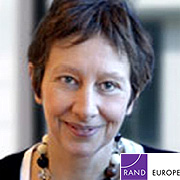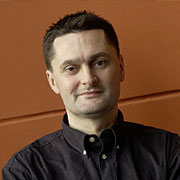Collaborators
Advisors
Professor Jo Chataway
 Professor Jo Chataway is Director of the Innovation and Technology Policy team at RAND (Europe).
Professor Jo Chataway is Director of the Innovation and Technology Policy team at RAND (Europe).
She is also a Professor in Biotechnology and Development at the Open University and co-director of
the ESRC INNOGEN centre for research on social and economic aspects of life sciences innovation.
Her research interests focus on translating innovation into processes, practices and policies that have
the potential to make a practical difference to societies, particularly those in developing countries. She
has a particular interest in global health and life science innovation, and has carried out a variety of
research projects examining global health and agricultural public–private partnerships, factors
influencing change within the pharmaceutical sector, and regulation of biotech and pharma.
The team she leads covers a portfolio which is cross-cutting and interdisciplinary, bringing together
existing research streams with new areas of study. Core competencies range from evaluation,
through to strategy development and policy analysis. These skills are applied to the team's four broad
research areas: research evaluation; understanding the issues around information and
communication technologies in society; regulatory policy; and finally, looking at health-related
research and innovation systems in a diverse range of countries.
Graduating cum laude and with Phi Beta Kappa honours she received a BA in Sociology from
Colorado College; an MPhil in Development Studies at the University of Sussex and a PhD in
Technology Policy from the Open University.
Dr Mark Batey
 We are delighted to have Dr Mark Batey as our Advisor on all aspects of creativity. He is well qualified to do so being both Joint Chair of The Psychometrics at Work Research Group at Manchester Business School and Research and Development Director at e-metrixx our partner in relation to the psychometrics of creativity. He is very much a world-leading authority on the Psychology of Creativity. In 2009, he was ranked 2nd in the world for published research into creativity and in 2010 appeared with Lord Robert Winston on BBC's Child of Our Time.
We are delighted to have Dr Mark Batey as our Advisor on all aspects of creativity. He is well qualified to do so being both Joint Chair of The Psychometrics at Work Research Group at Manchester Business School and Research and Development Director at e-metrixx our partner in relation to the psychometrics of creativity. He is very much a world-leading authority on the Psychology of Creativity. In 2009, he was ranked 2nd in the world for published research into creativity and in 2010 appeared with Lord Robert Winston on BBC's Child of Our Time.
Mark's research into the psychology of creativity focuses on understanding the psychological traits that can be used to understand how people approach being creative. He has examined intellectual, personality, motivational and confidence factors implicated in everyday creativity and problem solving and his latest contribution to the psychology of creativity is a comprehensive new model for understanding how creativity can be assessed. His ongoing research projects continue to explore the psychological factors related to everyday creativity, creativity at work and multi-level issues that draw upon theories of the individual, team and organisation.
He is an editor for the International Journal of Creativity and Problem Solving and sits on the Editorial Board for the American Psychological Association Journal of Psychology of Aesthetics, Creativity and Arts (PACA). He is also a reviewer for international journals such as Personality and Individual Differences, Learning and Individual Differences, Psychological Assessment, Intelligence, British Journal of Psychology, Creativity Research Journal and the Journal of Creative Behaviour. He also finds time to run the Psychology of Creativity discussion group on Linkedin, write a regular blog and lead training workshops, seminars and conferences on creativity.
Mark holds a degree in psychology from the University of York, a Masters in Occupational Psychology from the Institute of Work, Health and Organisation at the University of Nottingham and a PhD from University College London. His PhD involved the psychometric investigation of creativity.
Professor Andrew Atherton
 Professor Andrew Atherton
Andrew Atherton is Professor of Enterprise and Entrepreneurship and Senior Deputy Vice Chancellor
at the University of Lincoln. He has the brief for Research, Innovation and Enterprise at the University
of Lincoln. This includes strategic oversight of the 2013 Research Excellence Framework
submissions for the University, and a wide-ranging remit to encourage and stimulate enterprise and
innovation across the institution. In his role of Senior Deputy Vice Chancellor, Andrew has taken the
lead on major institutional projects, most notably the creation of the first new engineering school in a
UK university for several decades, in partnership with Siemens, a global engineering giant. This
partnership emphasises the development of 'industry-ready' graduates and is underpinned by a
dynamic portfolio of R&D commissions by Siemens. Andrew also leads on a wider agenda around reformulating
research as relevant and useful as well as world-class, including open strategies for
commercialising IP and maximising the impacts of academic research. Challenging conventional
notions of pure and applied research, relevant and useful research seeks to generate new insights
that are academically robust and also of use and value to partners in the public, private and third
sectors.
Professor Andrew Atherton
Andrew Atherton is Professor of Enterprise and Entrepreneurship and Senior Deputy Vice Chancellor
at the University of Lincoln. He has the brief for Research, Innovation and Enterprise at the University
of Lincoln. This includes strategic oversight of the 2013 Research Excellence Framework
submissions for the University, and a wide-ranging remit to encourage and stimulate enterprise and
innovation across the institution. In his role of Senior Deputy Vice Chancellor, Andrew has taken the
lead on major institutional projects, most notably the creation of the first new engineering school in a
UK university for several decades, in partnership with Siemens, a global engineering giant. This
partnership emphasises the development of 'industry-ready' graduates and is underpinned by a
dynamic portfolio of R&D commissions by Siemens. Andrew also leads on a wider agenda around reformulating
research as relevant and useful as well as world-class, including open strategies for
commercialising IP and maximising the impacts of academic research. Challenging conventional
notions of pure and applied research, relevant and useful research seeks to generate new insights
that are academically robust and also of use and value to partners in the public, private and third
sectors.
Andrew has worked with entrepreneurs and owner-managers of small and medium enterprises on
strategy and managing innovation since the mid-1990s, including development of the successful
Managing Innovation CPD programme at Durham University. He has published on innovation
processes in entrepreneurial ventures, new venture creation and enterprise policy development in the
UK, Europe and China.